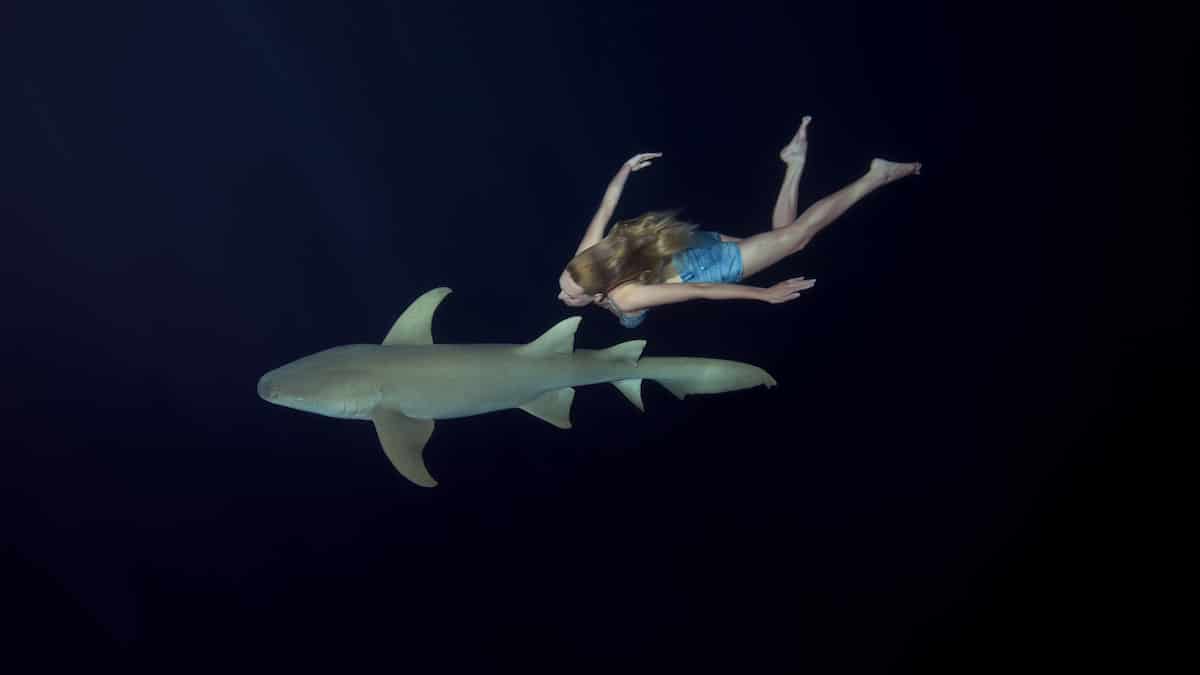

A woman swims at night with a shark in the Indian Ocean, Maldives on March 23, 2017. Andrey Nekrasov / Barcroft Media via Getty Images
Scientists are racing to create a cure for COVID-19, but the toll on sharks might be irreparable. Conservationists estimate that half a million of the predators may be killed to supply the world with a coronavirus vaccine when one is developed.
Shark liver oil is primarily made of squalene, which helps regulate a shark’s buoyancy in deep water. The compound is also found in plants, humans and other animals. Used as a moisturizing agent in cosmetics, squalene also creates a stronger immune response in vaccines, making them more effective, reported Science Times.
Squalene has been used in flu vaccines since 1997, Boston 25 News reported, and has an “excellent safety record” according to the CDC, Miami Herald reported. It could also help reduce the amount of vaccine needed per person, the Boston news report said.
Shark Allies, an advocacy group fighting against shark overfishing, claims that five COVID-19 vaccine candidates use shark squalene; the California-based non-profit is petitioning the U.S. Food and Drug Administration, Europe, China and all vaccine developers to omit the compound or find an alternative that doesn’t require sharks.
One British pharmaceutical that currently uses shark squalene in flu vaccines plans to manufacture a billion doses of the compound for potential use in coronavirus vaccines by May 2021, Sky News reported. VICE reported that roughly 3,000 sharks have to die to extract a single tonne of squalene.
“It’s called harvesting, but really you’re not growing it, you’re taking it from the wild,” Stefanie Brendl, executive director of Shark Allies, told Boston 25 News. “It’s a limited resource.”
Shark Allies worries that the development and production of enough vaccines to create worldwide immunization to the novel coronavirus and future coronaviruses that are identified could carry “an immense ecological cost,” VICE reported.
“It’s something we need to get ahead of ASAP, because we are facing many years of vaccine production, for a global population, for many more coronavirus vaccines to come,” Brendl told VICE. “The real danger is in what this can turn into in the future. A reliance on shark oil for a global vaccine — it’s truly insane. A wild animal is not a reliable source and cannot sustain ongoing commercial pressure. [And] the overfishing of sharks globally is already at critical levels.”
The conservationists fear that a global vaccine using shark squalene will endanger most shark species and could potentially wipe out some more threatened species, Miami Herald reported. Shark populations are vulnerable because they reproduce in low numbers and are slow to mature. According to VICE, great whites, hammerheads and whale sharks are among those most often targeted for their livers. According to Oceana, deep-sea sharks are especially vulnerable because their livers contain more squalene than other species as it helps them adapt to their environment, reported Miami Herald.
“We’re not trying to take anything away from humanity and say don’t cure yourself, don’t create a vaccine,” Brendl told Boston 25 News. “What we’re saying is the alternative is already there.”
In a popular online campaign, Shark Allies outlined the non-shark alternatives for squalene already in existence. Plant-based oils can be harvested from things like yeast, wheat germ, sugarcane and olive oil, VICE and Miami Herald reported. Bacteria-created squalene has also been researched, the petition noted. The problem with these alternatives is that they are about 30% more expensive and harder to extract than shark-based squalene, Miami Herald reported.
A team of researchers in Poland who were working on a plant-based squalene alternative in 2013 stressed in their report that “in the interest of protecting biodiversity, raw materials of animal origin must be replaced by alternative sources that respect our environment.”
Shark Allies also noted that there are coronavirus vaccines in development that do not require squalene at all and encouraged the development of those alternatives.
- Sharks Are Vanishing From Many of the World's Reefs - EcoWatch
- Sharks: Imperiled, Maligned, Fascinating - EcoWatch
- How to Protect Sharks From Overfishing - EcoWatch
- Coronavirus: Can We Trust Recent COVID Vaccine Successes? - EcoWatch
- Baby Megalodon Sharks Were Six-Foot-Long Cannibals, Study Finds
- Shark and Ray Populations Declining Rapidly, Scientists Call for Urgent Fishing Limits - EcoWatch
- Antarctica Wildlife May Be Impacted by COVID-19
- Behind the Science: How Do We Know How Many Shark Species Are at Risk? - EcoWatch

 233k
233k  41k
41k  Subscribe
Subscribe 